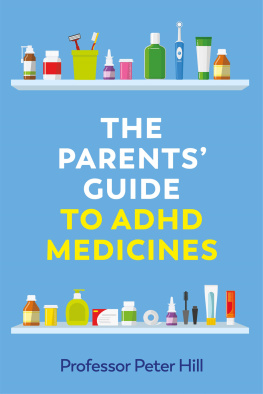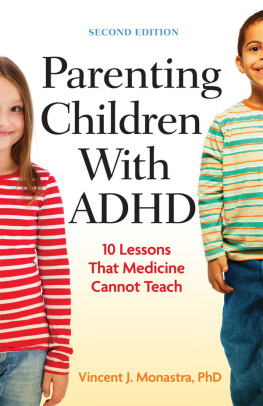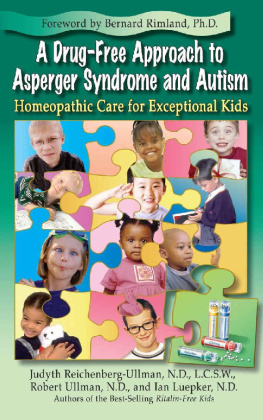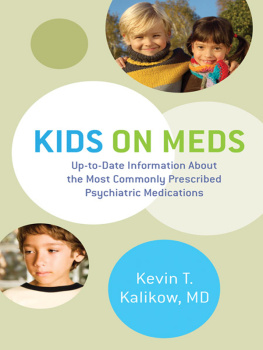A Parents Guide to Childrens Medicines
A Johns Hopkins Press Health Book
A Parents Guide to Childrens Medicines
Edward A. Bell, Pharm.D., BCPS

NOTE TO THE READER : This book describes medications as they are prescribed and given to children in general. It was not written about your child. The services of a competent professional should be obtained whenever medical or other specific advice is needed.
All efforts have been made to ensure the accuracy of the information contained in this book as of the date of publication. The author and the publisher expressly disclaim responsibility for any adverse outcomes arising from the use or application of the information contained herein.
2012 Edward A. Bell
All rights reserved. Published 2012
Printed in the United States of America on acid-free paper
9 8 7 6 5 4 3 2 1
The Johns Hopkins University Press
2715 North Charles Street
Baltimore, Maryland 21218-4363
www.press.jhu.edu
Library of Congress Cataloging-in-Publication Data
Bell, Edward A., 1959
A parents guide to childrens medicines / Edward A. Bell.
p. cm. (A Johns Hopkins Press health book)
Includes bibliographical references and index.
ISBN 978-1-4214-0623-7 (hdbk. : alk. paper) ISBN 978-1-4214-0624-4 (pbk.: alk. paper) ISBN 978-1-4214-0673-2 (electronic) ISBN 1-4214-0623-3 (hdbk.: alk. paper) ISBN 1-4214-0624-1 (pbk.: alk. paper) ISBN 1-4214-0673-X (electronic)
1. Pediatric pharmacologyPopular works. 2. DrugsPopular works. I. Title.
RJ 560. B 45 2012
615.1083dc23 2012000018
A catalog record for this book is available from the British Library.
Illustrations by Elizabeth Allen
Special discounts are available for bulk purchases of this book. For more information,
please contact Special Sales at 410-516-6936 or specialsales@press.jhu.edu.
The Johns Hopkins University Press uses environmentally friendly book materials, including recycled text paper that is composed of at least 30 percent post-consumer waste, whenever possible.
CONTENTS
Why I Wrote This Book
At some point, most parents have questions about how safe and useful a particular medication will be for their child. The medication may be available over the counter, like cough syrup, or it may be prescribed by a doctor, like an antibiotic. Parents want to know: Is the medication safe? Is it effective? Will it help my child? As a pediatric pharmacist for twenty-three years, I have listened carefully to these questions to identify the mothers or fathers concerns. I hope I have given empathetic answers in replyand my answers are always based on the latest scientific information.
The answers to the questions are usually, but not always, clear-cut. Many childrens medicines are available today. These medications can effectively cure medical problems, prevent serious illnesses, or control chronic childhood problems such as asthma. Many medicines can greatly improve a childs life. All have the potential to cause side effects, however, and parents should understand these side effects.
Information from Web sites, magazine and newspaper articles, and advertising may be useful, but it may also be contradictory and misleading. It is easy for a parent to get confused. For example, many Internet sites inaccurately describe some medications as being dangerous to all children.
I decided to specialize in pediatric pharmacy because I enjoy working with children and talking with parents about their childrens medications. As my own children grew up, my wife and I faced questions about whether they would benefit from using a medication. In this book I discuss many of the questions that parents have about medicines. I also address some of the concerns about childrens medications that are raised in the newspapers and on television. I offer my professional opinion about using medications for various childrens medical problems, and I discuss the science behind using medications, including results of scientific studies and the recommendations of professional medical organizations and the nations pediatric medical experts.
It is my hope that this book will be able to help you, the parent, make informed decisions about what is best for your child when it comes to using any medicine.
* * *
This book would not have been possible without the support and advice from the following, whom I thank:
My wife and children, for their love and support.
The College of Pharmacy and Health Sciences of Drake University, for granting me sabbatical leave and the time to write this book.
The health care professionals of Blank Childrens Hospital and Clinics.
The following individuals, for providing valuable advice and content review:
Dr. Wendi Harris, pediatrician reviewer, Des Moines, Iowa
Dr. Debra Bixler, pediatrician reviewer, Des Moines, Iowa
Dr. Lynne G. Maxwell, Philadelphia, Pennsylvania
Jolene McCoy, parent reviewer, Des Moines, Iowa
Dr. Phil Brunell, Bethesda, Maryland.
The publishing staff of the Johns Hopkins University Press.
A Parents Guide to Childrens Medicines
CHAPTER 1
Should I Give Medicine to My Child?
I dont like giving medicine to my child, many parents have told me, and I certainly understand their concerns. As a mother or father, you may be afraid of a medicines side effects, or you may wonder if the medicine will help your child. In this chapter, I provide information you will want to consider. I also suggest questions you may ask your childs doctor and pharmacist when medicine has been recommended to treat your childs illness. This information can help you feel more comfortable that you are doing what is best for your child.
Some of the questions I discuss in this chapter are:
What are the benefits of giving medicine to my child?
What are the risks of giving medicine to my child?
How do medicines work in a child, and how do they work differently in older children and adults?
Are side effects of medicines similar in children and adults?
Why are some medicines not appropriate for children?
What are the benefits and risks of giving medicine to my child?
Parents who dont like giving medicines to their child are probably concerned about the side effects of a medicine. Their concerns are understandable, especially if the child is an infant, because all medicines have the potential for side effects. Fortunately, the side effects of most medicines are not dangerous. The side effects of some medicines may be serious, however, so you should be familiar with the side effects that may occur with any medicine you give your child. When a medicine is given to an infant or child, it should have a benefitto cure an illness or to make the child feel better. When thinking about whether to give medicine to your child, ask yourself: What is the benefit and what is the risk of giving this medicine to my child? The benefit of giving medicine to your child should be greater than the risk (the side effects).
What benefits do medicines have for my children?
Medicine can:
cure an infection (for example, an ear infection),
make your child feel better (for example, lower your childs fever),
improve control of a chronic disease (for example, asthma), and
prevent a serious illness (for example, measles).
Many medicines can be very effective and can greatly help your child.
Next page






